- Home
- Sherry Thomas
A Dance in Moonlight
A Dance in Moonlight Read online
A DANCE IN MOONLIGHT
Sherry Thomas
COPYRIGHT
This is a work of fiction. Names, characters, places, and incidents are the product of the author’s imagination or are used fictitiously. Any resemblance to actual events, locales, or persons, living or dead, is purely coincidental.
“A Dance in Moonlight,” © 2012 by Sherry Thomas.
Cover design © Courtney Milan.
Cover photography credits © Spinnaker555, Tony Brindley, Halay Alex, and Inga Ivanova | Shutterstock.com
Digital Edition 1.0
All rights reserved. Where such permission is sufficient, the author grants the right to strip any DRM which may be applied to this work.
CONTENTS
Chapter One
Chapter Two
Chapter Three
Chapter Four
Chapter Five
Chapter Six
Chapter Seven
Chapter Eight
Epilogue
About Sherry Thomas
Extras
Excerpt from Ravishing the Heiress
Other books by Sherry Thomas
About Midnight Scandals
Excerpt from One Starlit Night by Carolyn Jewel
Excerpt from What Happened at Midnight by Courtney Milan
Chapter One
Summer 1896, Somerset, a few miles south of the Exmoor hills
THE WOMAN WAS BACK.
Ralston Fitzwilliam had seen her once before, two days ago. He had been on the tail-end of a fourteen mile walk, up and down hills so gentle they were barely bumps in the ground, across rain-swollen streams, and alongside green, sheep-dotted pastures.
Given that dark rain clouds, so low he could almost touch them, had crowded the sky from horizon to horizon, he should have gone straight home to Stanton House, set at his disposal by the Duke of Perrin for the few weeks a year Ralston spent in England. But the walk had not been sufficiently tiring for a man who wanted his limbs aching and his mind blank, so he had traversed Beauregard’s farm and headed up the slope at the top of which sat Viscount Northword’s country seat.
Only to have the rain come down hard halfway uphill. He veered toward Doyle’s Grange, a smaller property of the Northword estate. It was vacant at present, and he could take shelter under its ivy-covered portico without being fussed over and lectured about the foolishness of being abroad in such weather, without even an umbrella. As he approached the garden gate behind the house, she had appeared on the garden path, a young widow all in black.
She was beautiful—tall, regal, her hair as dark as the beads of jet that trimmed her hat. But what had truly caught his eye was the story of her life that had been written on her otherwise exquisite face.
It had not been the easiest of lives. There was an air of fragility to her—not an inborn timidity, but the residual fear of someone who had been burnt by the vagaries of fate.
He recognized himself—as he had been for many years, and perhaps even as he was now.
She hurried into the house without noticing him. But he thought of her as he waited out the rain beneath the eaves of the garden shed, for the entirety of his walk home, and when he extinguished his light at night.
He called on Doyle’s Grange the next day, but the front gate was locked, the house shut tight.
And now here she was again, a lovely, somber silhouette in the waning light of a summer evening, stepping down from a hansom cab, a satchel in hand. His heart leaped until he realized that the hansom cab, parked on the country lane before the blooming rhododendron hedge, did not leave. It was waiting for her to come out from the house and would ferry her elsewhere.
He hesitated. But before long, he found himself slipping into the front gate and walking up the drive. A movement of an upstairs curtain caught his eye—he had been sighted. Under the portico, as he raised his hand toward the bell pull, the door flung open, and she launched herself into his arms.
He was over six feet in height and sturdy of build. But she was at least five foot nine and no skeleton. He stumbled back a step.
Before he could quite recover from his surprise, she gripped his face and kissed him.
He’d kissed women to whom he hadn’t been properly introduced, but never before he’d uttered so much as a greeting. She was ravenous, almost barbarous, as if she wanted to level him to the ground and lay waste to him.
The next moment her kiss turned tender. Now she was kissing her beloved, thought to be lost on the battlefield, but found alive and well, needing only to be cared for and cherished. Her fingers, which had been digging hard into the sides of his head, relaxed. Her body fitted itself to his. And he, who’d until now been largely stunned, wondering how to disentangle himself without giving offense, was suddenly caught in the kiss.
She smelled of roses. Not the smothering scent he’d encountered at times, as if he’d been stuffed inside a perfume bottle, but light and fresh, like a single petal held beneath the nostrils. Her cheek beneath his hand was wondrously soft. And her body was all velvet—her mourning gown was made of the stuff—plush, smooth, sensational.
“Oh, Fitz,” she murmured, her arms banding tighter about him. “My darling Fitz.”
His nickname at school had been Bosh—he liked to roll his eyes and say “bosh” when his mates sprouted nonsense. But he supposed one could call him Fitz, short for Fitzwilliam. Which raised the question, who was she? Where had he met her before that she considered their acquaintance to merit such a passionate kiss at this reunion? And if indeed they knew each other so well, how was it that he did not have the least recollection of her?
But that was for later. For now, he pulled her closer and kissed her back.
ISABELLE ENGLEWOOD ALMOST COULD NOT withstand the wild burst of joy in her heart. Her Fitz, her beautiful, beloved Fitz. He had realized his mistake and returned to her at last.
He smelled wonderful—but different, of cedar and bergamot, with the faintest underpinning of oriental spices. And he was more substantial than she remembered—good, she preferred a little more meat on his bones. And how she loved the way he kissed her, with a gentleness that nevertheless scorched.
Since her return to England, he’d been reticent to be physically close to her. But not anymore. Now he was unhesitating. Now he was hungry.
As was she. She’d been dreaming of this moment. It had been more than eighteen months since she’d lain with a man, more than a decade since she understood that she wanted to wake up next to him every morning of her life.
She broke the kiss when she could no longer breathe. Locking her fingers together behind his neck, she rested her head against his shoulder and panted, all the while pressing kisses into his cheek and jaw.
At last he was hers to have and to hold. To love and to cherish. Tears welled in her eyes, but she did not care; it had been far too long since she’d wept tears of happiness.
Happiness, what an alien sensation.
She nibbled him just above his collar, and the sound that emerged from his throat was full of suppressed desire. And his body—she could feel his unsuppressed desire against her, making her giddy even as a tear escaped the corner of her eye.
She smiled. And giggled—she loved being dizzy with hope.
“Let’s go inside,” she said, reaching up to touch his hair. “But let me dismiss the cabbie first, before he begins to wonder what…”
She forgot what else she was about to say. The hair beneath her finger was brown, with perhaps the slightest reddish tint. Fitz’s hair was not brown; it was black, like her own. Not to mention when she last saw him, this very morning, his hair had been at least two inches shorter.
Dazed, she looked up into his eyes. “What happened to your—”
<
br /> The eyes that gazed back at her were green. Green. A man could conceivably dye his hair—or put on a wig. But how did he change the color of his eyes?
She leaped back from him. “You are not Fitz. Who are you?”
A SIMPLE CASE OF mistaken identity.
Which would have been rather funny, a woman kissing the wrong man, if she did not look so shattered.
She stared at him as if he were a piece of art for which she’d bartered all her worldly possessions, only to realize that he was but a forgery, an inferior copy of what she truly wanted. She blinked furiously, then, forgetting—or perhaps no longer caring—that she’d asked for his identity, she turned her back to him and reached for the door of the house.
“Mrs. Englewood,” he blurted out.
He’d spoken to the estate agent who had overseen the letting of Doyle’s Grange. He knew her name. He knew that she was the mother of two young children. He knew that she had lost her husband, a cavalry officer, in India.
“My apologies, Mrs. Englewood. I did not mean to…disrupt your evening. My name is Fitzwilliam and I live nearby. I was informed that you have taken Doyle’s Grange and hoped to make your acquaintance.”
The breath she took was audible. Stiffly, she turned her head enough to look at him. “I should apologize to you, Mr. Fitzwilliam. The mistake and the responsibility were both mine.”
For years, whenever he’d sought company, he’d made sure he singled out those who were carefree and lighthearted. Or at least, those who were as determined to be carefree and lighthearted as he, so that all his social interactions were characterized by a resolute cheerfulness. He did not quite understand why Mrs. Englewood, who made no effort to be jaunty and breezy, and whose pain was as unmistakable as her mourning gown, should exert such a pull upon him.
But he could not look away from her, this woman who did not hide her heartbreak. Who had perhaps never considered concealing her desolation beneath a frenzy of merrymaking.
“Clearly I have come at an inconvenient time,” he said, staring at her sharp profile. “I shall wish you a good evening and take my leave. But will you allow me to call on you again, perhaps next week?”
She bit her lower lip. “You are very kind, sir. But I will not be here next week. In fact, I plan to never come back again.”
Then he would never know her story. The thud of dismay he felt was out of all proportion with their negligible acquaintance. “But I understand you have signed a lease for an entire year.”
“So I have.” She briefly closed her eyes, as if the mention of the lease caused her actual pain. “But the lease only stipulates payment, not my presence.”
“I hope I have not contributed to—”
“No. No, indeed, sir. My mind was made up this morning. I came back to retrieve a personal belonging, that is all.”
Her hand opened and closed. It was obvious she wanted to be far from him, far from this house. He should be gentlemanly and understanding. Should immediately make himself scarce.
But he did not want to make himself scarce. He wanted to know what had made her kiss him with such devotion—and what made her unable to even look at him anymore. “If I may be so forward, Mrs. Englewood, did you change your mind, however momentarily, when you thought I was someone else?”
She jerked, as if he had slapped her, and turned away. “Good evening, Mr. Fitzwilliam.”
He’d already overstepped the bounds; what did it matter if he were to say something even more hugely inappropriate? “If it pleases you, Mrs. Englewood, you are more than welcome to call me Fitz.”
ISABELLE SPUN AROUND, her throat burning with anger. But at the sight of Mr. Fitzwilliam, she forgot what she was about to say. Even knowing that he was not Fitz, that he was but a stranger who bore an uncanny resemblance to the man she loved, it took a superhuman effort not to once more throw herself into his arms.
She turned her face to the side. It was easier when she didn’t look at him directly. “You do not know who Fitz is or what he means to me. Nor do you have the least idea how cruelly fate has already mocked me. To you I am but a chance for a dalliance, the possibility of one night’s pleasure—my acceptance would mean little to you, my refusal even less. So no, it does not please me to call you Fitz, as dear a name as I have ever known. And I would be forever grateful if I am never to see you again.”
She waited a few heartbeats for him to leave. When he did not, she reached for the door.
“I do have some idea how cruelly fate has mocked you, Mrs. Englewood—your anguish is writ plain on your face,” came his answer, in a deep, slightly gravelly voice that thankfully did not sound like Fitz’s at all. “I won’t deny that I also find you beautiful and that my thoughts may have occasionally turned amorous. But I am far more interested in your story than in your body, if that is what offends you.”
Wasn’t it enough she had already lived her life? She had no interest in recounting her sorry tale to anyone, least of all a man she was constantly on the verge of mistaking for Fitz.
“Goodbye, Mr. Fitzwilliam.”
She entered the house and shut the door firmly in his face. Then she sagged against the doorframe, her face numb with pain. She understood in her very marrow that life was cruel. This, however, was cruelty beyond even what she could endure.
She had lost Fitz the first time when she was eighteen, tears streaming down her face, watching him marry an heiress he barely knew, because a distant cousin’s death had saddled him with a title and a bankrupt estate. She had lost him a second time only hours ago, when he’d told her that he could not see himself living in this charming house with her, because he had, after eight years of marriage, fallen deeply in love with his heiress wife.
And now she had to lose him a third time when God saw fit to set in her path a man who looked almost exactly like him but—
Something struck her with the force of a thunderbolt: God had seen fit to set in her path a man who looked almost exactly like Fitz.
And she had been too stupid to understand what a gift it was.
Cursing herself, she lifted her skirts, ran up the stairs, and skidded to a stop before the sitting room window. Mr. Fitzwilliam had not yet vacated the property, but he was near the gate, passing through the long shadows cast by a line of pine trees.
Night was falling. She could not tell the exact color of his hair, except that it was darkish and noticeably longer than Fitz’s, which she did not mind. Fitz possessed a beautiful bone structure that would have carried off longer hair with poetic ease—but he never had because he was old-fashioned that way, always preferring his hair trimmed short.
Mr. Fitzwilliam reached up to pluck a pine needle. His motion was easy and graceful, like Fitz’s. His height was almost identical to Fitz’s. And though in her arms he’d felt more substantial, viewed as a whole he was far from bulky: wide shoulders, trim waist, and long limbs.
As if sensing her gaze, he glanced up over his shoulder. Her heart roared in her chest. Fitz, her dear, dear Fitz who had lingered beneath her window all those years ago, waiting for a glimpse of her, except he would pretend to be examining something in the garden, as if her mother’s rather scraggly rosebushes could sustain the interest of a young man with no particular fondness for horticulture.
How she’d loved holding herself flat against the wall and spying on him, to count how many times he looked up from his supposed botanical study to scan her window. Seven, eight, nine. She usually rewarded him after the tenth time by opening her window, leaning out, and calling his name.
Before she quite knew what she was doing, she opened the window, leaned out, and shouted, “Wait! Wait!”
Chapter Two
RALSTON COULD ALMOST HEAR the pounding of his heart in his ears.
She ran toward him, stopping bare inches away, her breaths audibly uneven in the quiet country twilight. Soon it would be too dark to make out her features, but for now her eyes shone with a wild, almost ferocious light. “Mr. Fitzwilliam, are you married
?”
He blinked. “No, I am not.”
“Are you promised to anyone, explicitly or implicitly?”
“No.”
She exhaled, as if in relief, only to tense again the next moment. He tensed too, a long breath held. He could not predict in what direction her questions were headed. Or perhaps he could and he was not quite ready for it yet.
She looked down. In the last remaining rays of the day, her lashes cast shadows over her cheeks. She licked her lips. And suddenly he thought of their kiss, the heat and urgency of it, the willingness of her body against his.
“You said I was welcome to call you Fitz, Mr. Fitzwilliam,” she said, her gaze somewhere to the left of him. “I can’t do any such thing, unless—unless you agree to pass for him.”
Somehow he managed not to exclaim aloud, though shock jolted through him. “Do I look that much like him?”
“The resemblance is uncanny, except for your coloring and your voice. If you remain silent and stay away from strong light, it would require no effort at all for me to believe that you are him.”
“I see,” he said slowly.
He’d expected something, but this was far beyond what he could have imagined.
She still did not look at him directly. “If you are willing to assume the role, then come back here at ten o’clock. I’ll leave the front door unlocked. I’m sure you can find your way to my room.”
Had she been a different woman, had the occasion been trivial and frivolous, he might have agreed, in exchange for a new, interesting experience. But reducing himself to a jointed dummy for her to pose and fondle when he wished to… He didn’t know exactly what he wanted, but it was not becoming a mindless substitution.
“If you are against the idea”—her voice caught—“you have but to walk away and I will never trouble you again. If not, you have also but to walk away—and dismiss the hansom cab on your way out. I’ve already paid the cabbie for the wait.”

_preview.jpg) Claiming the Duchess (Fitzhugh Trilogy Book 0.5)
Claiming the Duchess (Fitzhugh Trilogy Book 0.5)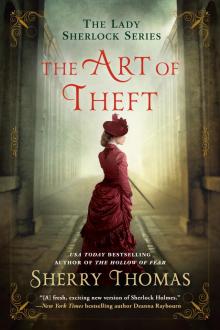 The Art of Theft
The Art of Theft The Magnolia Sword: A Ballad of Mulan
The Magnolia Sword: A Ballad of Mulan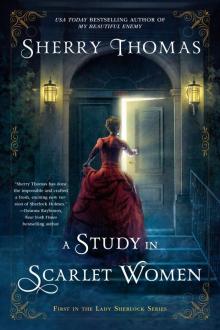 A Study In Scarlet Women
A Study In Scarlet Women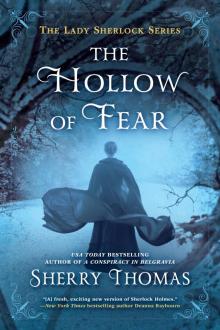 The Hollow of Fear
The Hollow of Fear The Magnolia Sword
The Magnolia Sword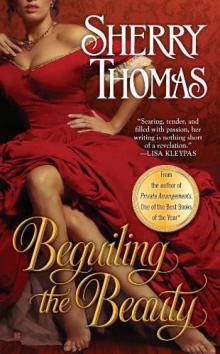 Beguiling the Beauty ft-1
Beguiling the Beauty ft-1 The Heart is a Universe
The Heart is a Universe The Hidden Blade: A Prequel to My Beautiful Enemy (Heart of Blade)
The Hidden Blade: A Prequel to My Beautiful Enemy (Heart of Blade)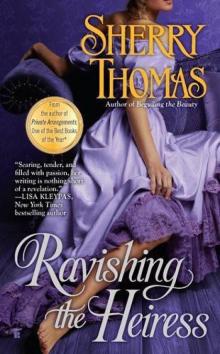 Ravishing the Heiress ft-2
Ravishing the Heiress ft-2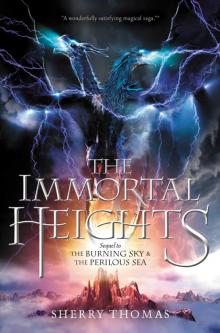 The Immortal Heights
The Immortal Heights The Hidden Blade
The Hidden Blade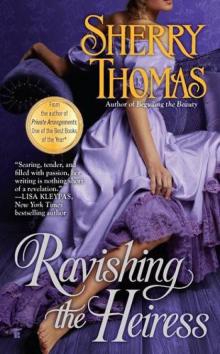 Ravishing the Heiress
Ravishing the Heiress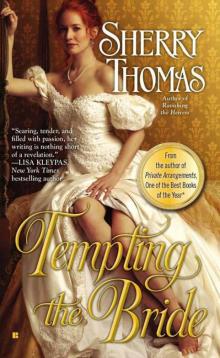 Tempting the Bride
Tempting the Bride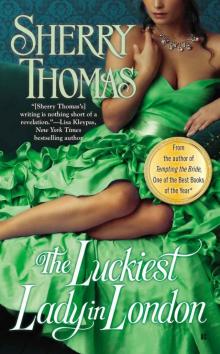 The Luckiest Lady in London
The Luckiest Lady in London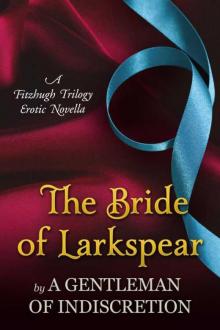 The Bride of Larkspear: A Fitzhugh Trilogy Erotic Novella
The Bride of Larkspear: A Fitzhugh Trilogy Erotic Novella Claiming the Duchess
Claiming the Duchess The One in My Heart
The One in My Heart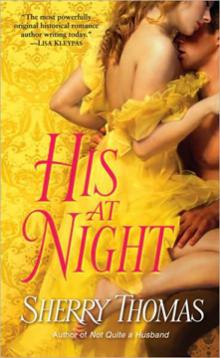 His At Night
His At Night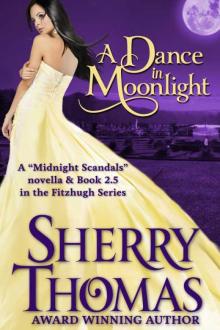 A Dance in Moonlight
A Dance in Moonlight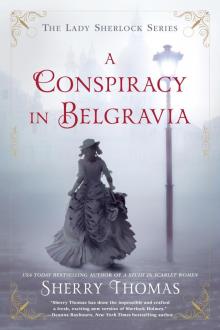 A Conspiracy in Belgravia
A Conspiracy in Belgravia Not Quite a Husband
Not Quite a Husband